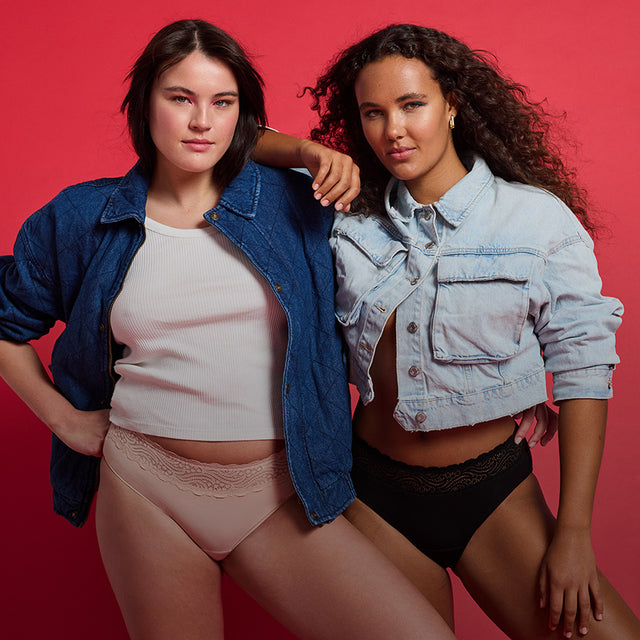How to start talking about the birds, the bees and periods with your kids
Ahh, the talk. Yep, that one. It’s a conversation most parents and caregivers and their kids would rather avoid, thanks largely to outdated perceptions of menstruation as a shameful thing. In the past, it’s been a touchy topic we tiptoe around, only talk about behind closed doors and keep hush-hush about for the rest of our lives.
But what if we told you that talking about the birds and the bees and periods with your children doesn’t have to be awkward or difficult? What if it could be an opportunity to instil a lifelong sense of courage and body confidence within them? To teach them that the changes that come with adolescence are not something to be embarrassed about, but embraced?
In this article, we’re sharing some tips for taking the stress out of ‘the talk’ and making it a positive, illuminating experience for the both of you.
How do puberty and hormones work? (A refresher)
If menstruation has been a part of your life, whether you’ve got your period, or lived with someone who has a period, you’ll be able to draw from personal experience during the chat. But prepping a little beforehand can help you feel more comfortable explaining how it all works and answering questions. (And as a result, your kids will feel more at ease.)
So, let’s brush up on the basics.
What is puberty?
Puberty is a natural process of change and growth that happens in adolescence. During this time, our organs and body systems mature rapidly. At the end of puberty, the body reaches sexual and reproductive maturity.
What hormones are involved in puberty?
All the changes your child will experience are caused by hormones. These natural substances govern everything that goes on in our bodies during puberty and continue to regulate our reproductive system throughout adulthood.
Two hormones that play a major role during puberty are estrogen and progesterone. Here’s a snapshot of these hormones’ roles in people who menstruate:
- Estrogen (or ‘oestrogen’) supports the reproductive organs to mature, ensures fertility, regulates the menstrual cycle, helps boobs grow and directs fat to the hips, legs and breasts.
- Progesterone is a steroid hormone released by the brain during the menstrual cycle to prep the body for pregnancy.
What changes happen during puberty?
Ch-ch-ch-changes. We’ll be banging on about them for a while longer because puberty is full of ‘em.
Even before the physical aspects of puberty appear, your child can expect to:
- Develop a stronger sense of self
- Start feeling sexually interested in other people
- Experience shifts in their mood, energy and sleep patterns
As puberty advances, they’ll usually start to notice:
- Breast growth and tenderness
- Changes in height and body shape
- Hair growth and thickening
- Skin changes (like acne)
- Vaginal discharge
For some young people, puberty also means getting their period for the first time.
How to talk about periods with your kids
To ensure your child comes away from your talk feeling prepared for this new stage of life, it’s important to explain how menstruation works.
Here are our top tips for how to talk about periods with your kids:
- Create a safe and comfortable space for your discussion.
- Stick to the facts – explain what the menstrual and ovarian cycles are.
- Explain what premenstrual syndrome (PMS) is and why it’s generally nothing to be afraid of.
- Encourage them to ask questions and get curious.
It’s also good to bust some pesky period myths by explaining that:
- Periods aren’t always regular.
- Some women don’t get their periods, and some people who get periods aren’t women.
- You can swim on your period as long as you’ve got the right protection.
What’s the right age to talk about periods with your kids?
You might be wondering what age to talk about puberty with your kids. In people who menstruate, puberty usually begins at around 10, but everyone is different. It’s good to have the chat early, before your child’s period starts, so they feel ready for what’s to come.
What period protection products should I recommend?
Period products have evolved so much over recent years, meaning people who menstruate now have a wide variety of reliable options to choose from.
Popular products include tampons, pads, menstrual cups and (our personal fave) period underwear. Each option has its pros and cons (for example, tampons are discreet, but insertion can be tricky), so it all comes down to what your child feels most comfortable with.
Nab some Modibodi essentials
Did you know that Modibodi has a whole line of teen period underwear perfect for folks just starting menstruation? Designed for kids as young as 8, our ultra-absorbent period underwear offers comfy, secure, discreet protection during school and sports – even sleepovers.
We also design period swimwear and sleepwear, so you can get all your child’s period care sorted right now – easy-peasy.
Time to start talking about
periods (You got this.)
Now you’ve got a clearer idea of how helpful and un-scary the period talk can be, you’re hopefully feeling more relaxed and confident about broaching the topic with your kids.
Remember, the aim is to nip period shame in the bud and present the menstrual cycle as a totally normal (even exciting) part of growing up.
Keen for more tips on supporting your child with managing their period? The Modibodi blog has got your back.







